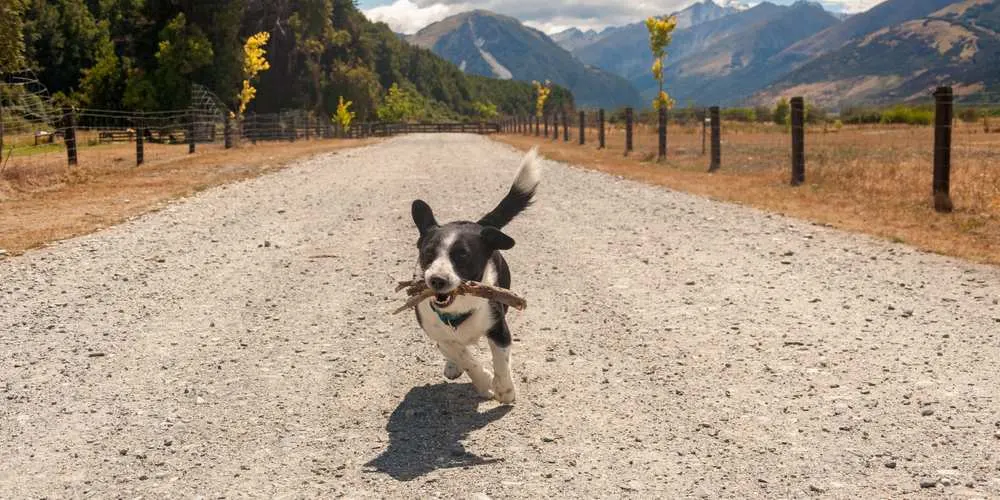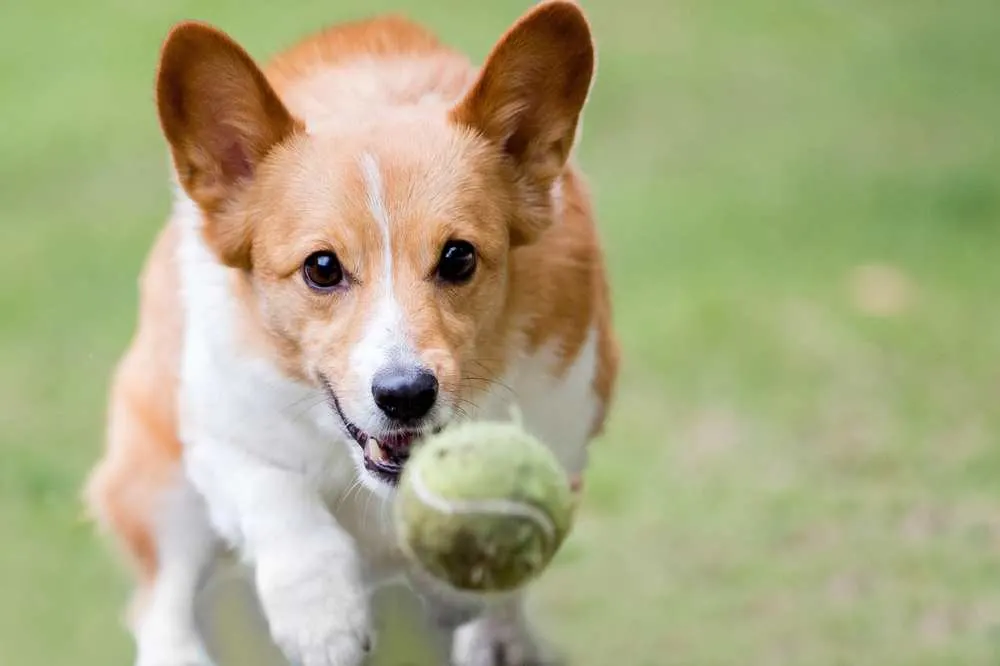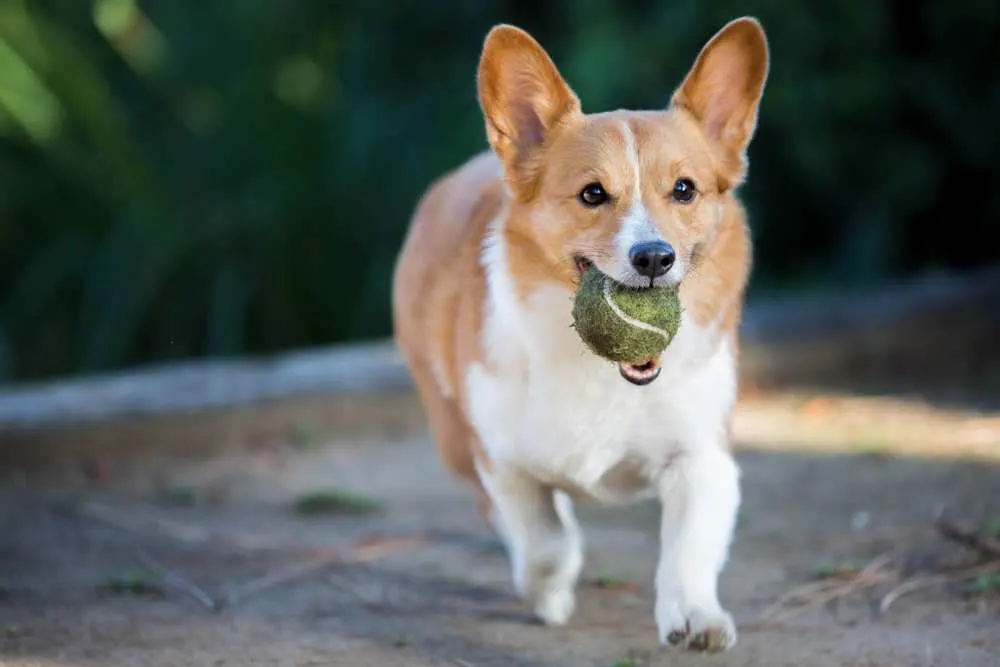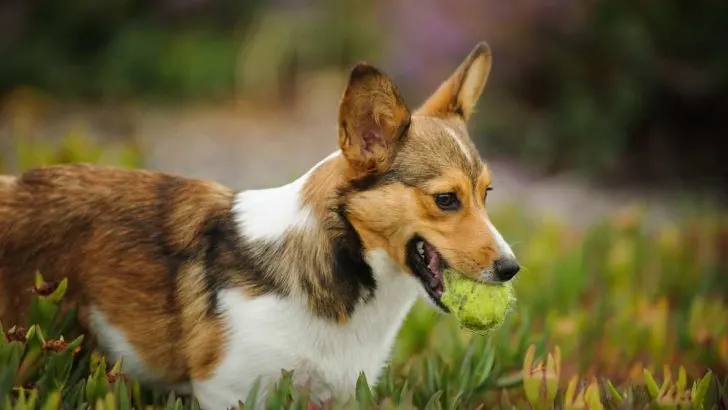If you’re thinking about buying a corgi and asking yourself is he any good at fetch, you’re in the right place. Even if you own a corgi and never played fetch with him, I have excellent news.
Corgis are a fantastic breed that loves to stay active and do fun stuff like fetch.
Normally, corgis have high energy levels and are rarely on the lower end of the spectrum when talking about active dogs vs inactive dogs.
This means every time you grab its favorite fetch ball or frisbee, your pet will go wild, knowing it’s fetch time. You should probably strap yourself in for a ride when doing this because sometimes their excitement is a bit too cute to handle!
If you’re seeking some tips and tricks on how to make fetch time great, you’re in the right spot, so I suggest you keep reading and take notes.

Play Time With Your Corgi
As I’ve said, corgis are high-energy dogs. This is due to their cattle-herding origin. These dogs have been used for heavy-duty work from the moment they reach their fully-grown size.
Do Corgis Fetch?
You might ask yourself “do corgis fetch?”, and that’s a perfectly valid question. I assure you, with a little bit of training they’ll bring to you anything you throw them.
The genetic memory of these dogs is pretty intense, so even if you never used your corgi for cattle-herding, its energy levels are going to be as close as possible to a corgi that’s a working dog.
In order to keep your corgi away from being hyperactive and non-obedient as a result of that, you’ll need to find some creative ways of regularly emptying its energy tank.
Trust me, fetch is the best of the best in this case. I’ve never seen corgis more excited about something besides fetch (maybe with the exception of feeding time).
Regardless of their small size in comparison to other working dogs, corgis can surprise you with the speed they can reach.
This allows them to be a very good partner in a game of fetch. All they need is an open field and an owner with a good throwing hand!
I’ve read some blogs on the internet in which corgi owners say their corgis aren’t interested in tennis balls, frisbees, or any type of store-bought fetching item. These owners claim their corgis’ favorite fetch items are pine cones and sticks.

You shouldn’t be looking at this and thinking “is there something wrong with my corgi?”, because there isn’t.
Like most dogs, corgis are prone to chewing their toys and making them unrecognizable. If your corgi decides to do this often, maybe it’s for the best if you use pine cones in your play of fetch.
But, be careful! If your corgi starts to nibble and chew on the replacement for the ball, regardless of whether it’s a stick or a pine cone, you should take it away from him right away and try to stimulate it to continue playing fetch.
Another thing that can be a substitute for a ball is a frisbee.
But can corgis play frisbee? They absolutely can. You just need to make sure when buying a frisbee for your corgi’s fetch play session that you don’t buy a frisbee that is too wide for your corgi to catch it in their mouth.
They usually do this when they’re bored or tired, so if your corgi is showing signs of overheating, you should probably head home.
This usually won’t happen right away, due to corgis needing a good hour to blow off steam. Fetch is a perfect way for you to help them do that because, in a game of fetch, they will have a constant excuse to keep running.
If you let your corgi play by itself, it’ll do what’s needed, but it’ll have trouble staying motivated for as long as it can if you’re involved in its playtime.

Corgi Genetics
I’ve only recently learned that corgis have been ranked as the eleventh smartest dog breed in the world. This allows them to learn new commands fast, and to figure out how a game of fetch is played quite quickly.
I strongly recommend going out and trying to teach your corgi how to play fetch if you’ve never done this before. I promise it’s a life changer! And one more thing if you’re a newbie when it comes to playing fetch with your corgi – don’t let their little legs fool you, they’re quite fast if you give them a good enough reason.
These working dogs have a deep-seated love for running around in the open field, even if that means chasing whatever you saw fit to play fetch with that day.
I know I saw a boost in my corgi’s happiness, and I’m sure you’ll do too when your pet learns that fetch is something that you’ll regularly do as an activity!
These dogs are known for figuring out and learning new habits, thus making them very easy to adapt to new games such as fetch. But, consider yourself warned. Corgis can be bossy little furballs. Due to how intelligent they are, they’ll quickly develop a liking of this new game you’ve implemented in their schedule, and if you stop doing it, they’ll demand it more and more!
So, in order to keep your corgi happy, I advise you to practice this newly implemented game regularly.
Are Corgis Clumsy?
These little balls of happiness can sometimes be a source of endless laughter.
They tend to find themselves in some hilarious positions, being stuck between pillows and cushions. This makes for a fantastic social media post! Even though these moments can mislead you to believe your corgi is clumsy, trust me that is not the case. Maybe you wandered are corgis good at fetch, or are they too clumsy to even try it?
They have perfect coordination of their little body and can be very deft in their movement.
This is also the case when talking about fetch. I guarantee you your corgi will surprise you with how fast and for how long it can run.

Taking Care Of Your Corgi After Playing
A good game of fetch can leave your corgi breathless and overheated, so it’s imperative to know when the game ends. It’s also good you keep fresh and clean water close by because this might just make the trip back home much easier.
Corgis can get carried away when doing things that they love doing, especially if they’re doing it with their favorite human. Be sure to give your corgi time to rest if you intend to walk or hike back home. If you skip this, you’ll probably end up with a corgi laying flat on its stomach on the concrete trying to cool itself down.
Needless to say, corgis being corgis (and exercising the stubbornness they are well-known for), you will have a tough time stimulating them to continue to walk. This can be avoided by giving your corgi good 15 to 20 minutes to rest, but not to cool off completely, before heading home.
As I’ve told you, corgis are able to play fetch for hours on end, until they feel exhausted and can’t move a muscle. It’s your responsibility to recognize this and call it quits when the time comes.
Another thing that I advise you to do is keep your pet’s paws clean and neat. Corgis (in the midst of dopamine rush) while playing often don’t worry about where they step and what their paws look like. I’ve had my corgi break a claw and not even notice!
For this reason alone it’s a good idea to check your corgi’s paws and claws after every playtime, just to make sure there are no splinters, broken claws, or dirt on them.
Personally, I use wet wipes to clean my corgis’ paws. It seems my furball is not a fan of wet wipes that contain perfume, so maybe go with the ones that don’t have a distinct smell, because it’ll maybe make things a bit easier not having your corgi try to lick the wet wipe while you try to clean its paws.

To Sum Up
I think it’s pretty clear whether are corgis good at fetch or not. Their genetics and excellent coordination are a good indicator of what these dogs are capable of. Even though their little legs seem like they can’t run as fast or as long, don’t let yourself be fooled by that.
Corgis are made to be a working dog, and their body is designed to withstand some serious physical activity. If you own a corgi, you know this by now. If you don’t and plan on getting one, you’ll find out soon enough.
Just make sure you teach them the rules you want to be followed when playing catch so your corgi doesn’t wander off and forgets what it was doing in the first place. You shouldn’t have a big problem with this, because as you know, corgis are fast learners!
So, pick your favorite ball (or pine cone), put your dog on a leash, and find a suitable field to start your dogs’ new favorite activity. Have fun!

